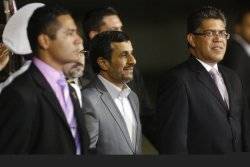Hugo Chavez, the Venezuelan president, has dismissed a US warning to avoid close ties with Iran, denouncing what he said was Washington's attempt to dominate the world as he welcomed the Iranian president to the Latin American nation.
Iran's Mahmoud Ahmadinejad arrived at the start of a tour to shore up support from the region's leftist leaders, as tough new Western sanctions aim to isolate the Islamic republic and target its vital oil exports.
"A spokesman or spokeswoman in Washington from the State Department or the White House said it was not convenient for any country to get close to Iran. Well, the truth is, it made you laugh," Chavez said in a televised speech.
"They're not going to be able to dominate this world. Forget about it (President Barack) Obama, forget about it. It would be better to think about the problems in your country, which are many," he said.
"We are free. The people of Latin America will never again kneel, dominated by the imperial Yankee. Never again," he said, to applause from his audience at an oil processing facility.
Obama signed measures into law on New Year's Eve that will make it harder for most countries to buy Iranian oil.
US warning
The European Union is also expected to announce some type of ban on Iranian oil by the end of this month.
Washington, long time at odds with the Islamic republic, has said that Ahmadinejad's planned tour of Venezuela, Cuba, Nicaragua and Ecuador showed Iran was "desperate" for friends.
"We are making absolutely clear to countries around the world that now is not the time to be deepening ties, not security ties, not economic ties, with Iran," a US state department spokeswoman said on Friday.
The sanctions are aimed at forcing Iran to halt its alleged nuclear work, which the United States and its allies say is aimed at producing bombs. Iran says it is for power generation. Iran has been under US sanctions since 1979.
Al Jazeera's Adam Raney reporting from Caracas said Venezuelans were divided about the Iranian state visit but many felt that as head of state, Chavez should be free to engage with leaders from all countries.
Ahmadinejad was met at Venezuela's Maiquetia International Airport by an honour guard, a red carpet, and a reception committee of about 100 people led by Elias Jaua, the vice president.
It remains to be seen how far Chavez would go in backing Iran's warning to close the Strait of Hormuz, the world's most important oil shipping lane, or how much he could undermine US machinations by providing fuel or cash to Tehran.
Iran made the threat on the back of increased US sanctions. In the past, Chavez has threatened to stop oil exports to the United States but has never followed through.
Other regional leaders due to receive Ahmadinejad, like Nicaraguan President, Daniel Ortega and Ecuadorean President, Rafael Correa, have a similar ideological stance to Chavez, but fewer resources.
US power envy
Ahmadinejad, who is subordinate to Supreme Leader Ayatollah Ali Khamenei on foreign policy, has said little about the rising tensions with the West, leaving it to Iran's military commanders to issue the most bellicose statements.
The increasingly warm relations between Ahmadinejad and Chavez are a growing source of concern for Obama. Last year, Washington imposed limited sanctions on Venezuela's state oil company PDVSA after accusing it of violating an earlier set of sanctions by sending at least two shipments of oil products to Iran.
That did nothing to curb PDVSA's crude exports to the United States, which amount to almost a million barrels a day. Chavez highlighted Venezuela's many energy joint ventures with China during his broadcast from the huge Petro Monagas oil facility
Chavez accused the US government of trying to slow China's advance as a great power of the 21st century. "The imperial Yankee is also trying to put the brakes on Russia, as an emerging power again after the fall of the Soviet Union. And the imperial Yankee is trying to slow the growth of Iran as an intermediate power," he said.
"They are inventing that Iran, Venezuela, Cuba and Nicaragua are preparing attacks against the United States ... You have to watch it carefully. It is a threat against us."
PHOTO CAPTION
Iran's President Mahmoud Ahmadinejad (C) is welcomed by Venezuela's Vice-President Elias Jaua (R) at Simon Bolivar airport in Caracas January 8, 2012.
Aljazeera


 Home
Home Discover Islam
Discover Islam Quran Recitations
Quran Recitations Lectures
Lectures
 Fatwa
Fatwa Articles
Articles Fiqh
Fiqh E-Books
E-Books Boys & Girls
Boys & Girls  Hajj Rulings
Hajj Rulings Hajj Fatwas
Hajj Fatwas














